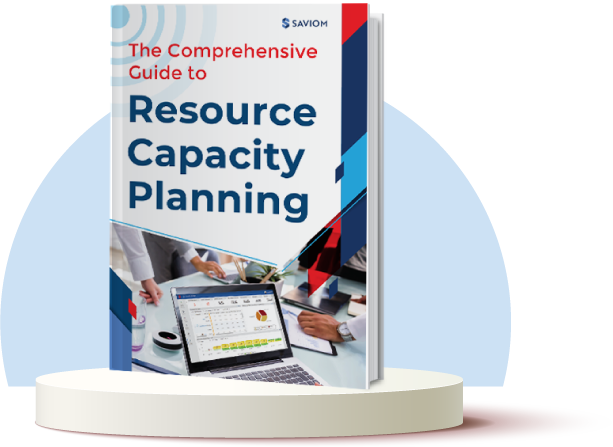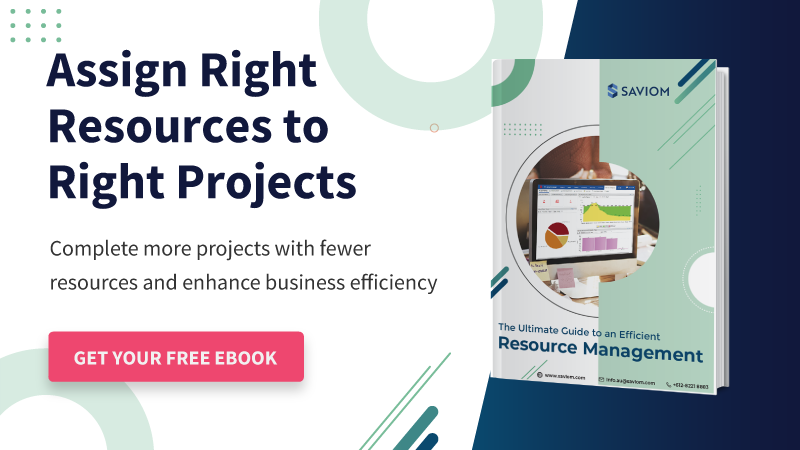Demand for accountants and auditors is projected to grow by 6% from 2021 to 2031, about as fast as the average for any other occupation.
-Job Outlook
The above stat explains the growth of audit and accounting services in the coming years. With this constant surge in demand, organizations find it challenging to meet the requirements of the audit & accounting workforce. Therefore, they need a cost-effective resource plan to counter the same. Additionally, the lack of planning and scheduling results in low productivity, frequent hiring/firing, project delays, budget overruns, etc., hamper project quality and subsequently negatively impact the brand of the firm.
To gain a competitive edge, accounting & audit firms need effective resource planning and scheduling.
It enables them to leverage the maximum potential of their workforce, identify, forecast and allocate competent auditors and accountants to projects at the right time and cost. Further, it helps meet future resource demands, control project costs, eliminate last-minute firefighting, etc.
This blog discusses the various benefits of resource planning and scheduling in audit and accounting firms.
But first, let’s understand the basics.
Audit and accounting firms: types & functions
Accounting and auditing consultancy firms analyze the financial data for their clients to facilitate business decisions. In addition, these firms help companies organize and manage their cash flow, conduct regular audits, and provide tax/financial advisory services.
Accounting refers to the process of capturing, classifying, summarizing, analyzing, and presenting the financial records, transactions, profitability, statements, and financial position of an organization. It is the process of recording the financial transactions of a business.
On the other hand, auditing is a specialized service where an organization’s financial statements and records are examined. It ensures that financial statements are prepared in accordance with the relevant accounting practices.
The different types of audit and accounting firms are-
Full-Service Accounting Firms
Generally, full-service accounting firms provide a wide range of services, like tax preparation, advisory, auditing, etc. As a result, these firms are big in size in order to accommodate clients with various needs.
Tax Firms
Tax firms are specialized accounting firms that focus almost exclusively on tax preparation, planning, and resolution of businesses as well as individuals. Usually, accountants working at these firms are certified public accountants (CPAs).
Audit Firms
Audit firms perform third-party investigations into a company’s finances or other areas. They also conduct annual audits for the corporate sector, small businesses, the government, etc. Some of the professionals working here include forensic accountants, risk analysts, tax consultants, etc.
Outsourced Accounting Firms
Small business owners are often required to outsource their accounting needs in order to avert the costs of maintaining an in-house accounting department. Outsourcing accounting firms provide their clients with full accounting services and handle their finances.
Bookkeeping Firms
A bookkeeping firm keeps records and tracks income, expenses, payroll, and, in some cases, tax returns for business clients.
After knowing a brief about audit and accounting firms, let’s understand how resource planning and scheduling are different for these firms.
How are resource planning and scheduling different for audit and accounting firms?
As a professional service industry, resources in the audit and accounting sectors play a vital role in generating revenue for the organization. Therefore, they need to ensure that the numerous generalists and niche skilled resources, such as actuaries and forensic consultants, are working on billable projects.
In addition, the seasonal demand fluctuations in this sector for accountants, auditors, tax analysts, etc., is inevitable. Therefore, organizations need to plan and schedule their resources in advance to meet these requirements. When they fail to do so, it can result in business loss and client dissatisfaction.
However, most audit and accounting organizations still rely on spreadsheets or home-grown tools for scheduling and planning their resources. This often leads to double bookings, lower productivity, employee burnout, disengagement, and billing losses. Moreover, these legacy solutions lack forecasting capabilities, resulting in last-minute firefighting for competent resources, cost escalations, compromised quality, or loss of business.
Therefore, it is vital for an audit and accounting firm to implement an enterprise-level resource scheduling and planning process to utilize their resources optimally. It enables organizations to identify and deploy competent consultants to projects at the right time and cost. In addition, it also helps to maximize the billable utilization of consultants by mobilizing them from non-billable or low-priority work to billable or high-priority projects.
In a nutshell, resource planning and scheduling enable audit and accounting firms to tap into their workforce’s maximum potential and improve business profitability and sustainability.
Read More: What is Resource Scheduling? How to Schedule Resources for Projects Efficiently?
Now, let’s learn about the different benefits.
Benefits of resource planning and scheduling in Audit & Accounting firms
Resource planning and scheduling can provide myriads of benefits to these firms.
Here are a few –
Minimizes auditors, consultants, and accountant costs significantly
Since the accounting sector utilizes specialized resources such as actuaries and tax analysts, their resourcing costs are relatively high. Effective resource planning and scheduling help managers identify and allocate cost-effective accounting resources to different activities. For example, instead of assigning a senior financial analyst to create financial reports or review internal controls, the manager can allocate a skilled junior counterpart or an intern for this purpose.
In addition, they have enough lead time to conduct planned hiring in place of last-minute activities and create the right resource mix that suits the project budget. This reduces the consultant cost significantly, thereby ensuring the successful delivery of the project within the budget.
Bridges capacity vs. demand gap of consultants proactively
In audit and accounting firms, the consulting managers are responsible for forward-planning pipeline projects by analyzing the requirements in advance. Since accounting projects have shorter duration and resources work on multiple projects simultaneously, managers need to implement appropriate measures proactively to bridge the capacity vs. demand gap.
If there is an excess of consultants, managers can bring forward future projects, provide training or sell additional capacity. On the other hand, a shortfall of consultants for auditing projects can be mitigated by organizing appropriate upskilling programs for the resources or through planned hiring. Thus, forecasting and bridging the gap proactively eliminates the chances of last-minute hiring and helps in futureproofing the consultants.
Read More: 5 Best Practices for Capacity Management
Ensures competent allocation of accountants and auditors
An audit and accounting firm may have employees with diverse skills working from multiple locations. Based on that, the auditors and accountants can have multiple reporting line in a complex matrix structure. Thus, to allocate the right employees, managers need 360-degree visibility across the organization.
Resource planning helps managers get a complete view into the present and future bookings of resources and also provides insights into various attributes like availability, schedules, skills, etc. Also, the accounting managers can consider employees’ interests before deploying them to projects. That way, managers can find the best-fit resource with the right skills for the project and ensure a competent allocation.
Helps create the right mix of a permanent and on-demand workforce
A balanced mix of permanent and on-demand consultants helps accounting firms cater to evolving client expectations and prevents last-minute firefighting, thereby minimizing high-resourcing costs. In addition, during resource planning, audit managers can assess the skill requirements and compare them with other pipeline projects to determine if the demand is for niche skilled- resources.
Based on that, they can hire a permanent worker for recurring needs and contingent workforce for a one-off skill demand. For example, during the financial year-end, there is an increased demand for auditors, so the manager can hire an on-demand to complete the project. This will eliminate the challenge of finding suitable projects to redeploy on-demand employees and reduce unwanted firing cycles.
Read More: What is a Contingent Workforce and Why an Organization Needs It
Maximizes profitable utilization of auditors’ and accountants
The billable hours of audit and accounting staff plays a crucial role in enhancing the profitability of accounting firms. Therefore, it is necessary to optimally utilize accounting resources to maintain a healthy top and bottom line. Resource planning and scheduling enables managers to assign audit/accounting resources to billable tasks and maximize profitable utilization.
If there is any deviation, they can take remedial measures to control the situation. For instance, a senior auditor is allocated to work on non-billable or admin tasks like data entry for 50% of their capacity. In that case, the audit managers can mobilize them to billable or strategic audit projects, allowing them to use their skills in revenue-generating work. This will facilitate them to maximize productivity and enhance profitability.
Facilitates timely delivery of accounting projects within budget
Meeting project deadlines and preventing budget overruns are the benchmarks for effective delivery. Proper resource planning and scheduling enables managers to assign cost-effective auditors and analysts with the right skills to suitable projects. This enables organizations to complete projects within the stipulated time without disrupting the quality.
In addition, it also helps managers to periodically review accountants’ performance using actionable insights from various reports in real-time. This enables them to implement appropriate measures in case of variance and prevent budget and schedule overruns. Timely delivery project delivery improves client satisfaction, higher retention, enhanced work rate, and increased brand loyalty.
Optimizes the resources schedules during the seasonal fluctuations
Audit and accounting firms witness a surge in demand during the financial month, where managers tend to allocate work beyond consultants’ capacity to meet the deliverables. They also deal with a fall in demand during the trough period, where finding work for accountants becomes challenging. Efficient resource planning and scheduling helps organizations to prepare for seasonal fluctuations and initiate remedial actions to optimize resource schedules.
For example, while working on tax advisory projects during seasonal peaks, if the tax analysts are over-utilized, then managers can procure additional analysts to the project or adjust the project timelines. On the contrary, to prevent underutilization and increased bench size, managers can implement training programs for tax analysts to prepare for future projects and avoid skill obsolescence.
Read More: How can you Implement Workforce Optimization to Improve Productivity?
Now that we know the benefits let’s understand how resource management solutions can help.
How can modern ERM software streamline planning & scheduling in audit & accounting firms?
Advanced resource management software provides efficient resource planning and scheduling capabilities that helps audit and accounting firms utilize their resources optimally.
Resource management software provides 360-degree visibility into audit projects/non-project activities, vacations, BAU/admin, etc. In addition, the software maintains up-to-date competency information to match the skillset with the right task.
Additionally, using resource scheduling solutions, the senior audit managers can assign competent auditors to suitable opportunities. The advanced filters and other selection criteria help them to uniformly distribute the employees working in different departments, like tax, accounts, etc., across projects. It also allows them to deploy cost-effective global resources for different audit projects from low-cost locations.
Moreover, the forecast vs. actual reports and utilization helps accounting supervisors implement corrective measures in advance if accountants are over/underutilized. It also helps them to mobilize skilled accountants from non-billable or low-priority work to billable or high-priority projects.
Further, it also provides managers with lesson-learned reports, which allows them to get past information about the various previous projects and improve estimations for similar future projects.
Apart from this, the modeling and simulation technique provides accounting managers with complete information on how various outcomes of specific scenarios can impact the accounting firm. This enables accounting managers to select the ideal resource plan and make informed decisions on future projects.
Read More: How Outdated Resource Management Tools are Hurting Businesses?
The bottom line
Effective resource planning and scheduling are essential for an organization’s sustainability and profitability. It plays a crucial role in keeping the firm future-ready and competitive in volatile and uncertain market conditions. It is only possible to reap the benefits when organizations use a robust resource management solution, which can identify and mitigate bottlenecks. This will also help leverage the maximum resource potential for higher productivity and business efficiency.
Are you ready to effectively plan your resources and achieve fruitful results?
The Glossary
Read More: Glossary of Resource Workforce Planning, Scheduling and Management
The SAVIOM Solution
SAVIOM is the market leader in helping multinational clients manage their resources efficiently and effectively. With over 20 years of experience, this Australian-based MNC has a global presence across 50 countries and has helped 100+ clients with their Workforce Planning Software. Saviom also provides Enterprise Project Resource Management, Project Portfolio Management, and Professional Service Automation tools. Boost your remote team collaboration with Saviom.












